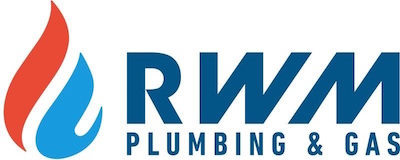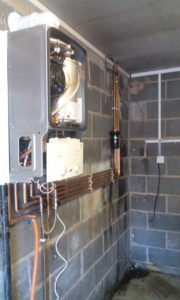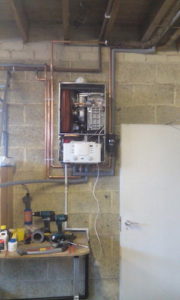At RWM, we offer full boiler and central heating installation services. We supply the most efficient boiler for your property and needs and are often able to fit it in your desired location. Once the boiler installation is complete, Our engineers will demonstrate the boiler controls and show you how to efficiently run your new system. We offer an outstanding service from start to finish.
Types of Central Heating system
A combination or ‘combi’ boiler is both a high efficiency water heater and a central heating boiler in a single compact unit. Combi boilers heat water directly from the mains when you turn on a tap, so you won’t need a hot water storage cylinder or a cold water storage tank in the roof space.
They are also very cost-effective and energy-efficient as water is heated instantly rather than being heated and then stored in a cylinder. An added benefit is that hot water is delivered at mains pressure, which means that you could get a powerful shower without the need for a separate pump.
- Compact sizes make combi boilers perfect for smaller properties
- Ideal where there is little or no loft space
- No need for a hot water cylinder allows increased living space
- No cold water storage tank frees up a loft for conversion
- No risk of loft pipework freezing
- Less pipework in the home makes installation typically cheaper
System boilers require a cylinder for storing hot water, however the major heating and hot water system components are built into the boiler itself, making it quicker and easier to install. In addition, there is no need for a tank in the loft, so it can be an option in a home with little or no loft space or where the space is earmarked for a conversion.
These boilers are also compatible with solar water heating systems, which deliver environmental benefits as well as lower energy bills.
- Ideal for homes with more than one bathroom
- Constant supply of hot water to any number of taps at the same time
- No need for a loft tank, freeing up space and eliminating worries about leaks or frost damage
- Economical to run
- Built-in components makes installation quicker and neater
Regular boilers (sometimes known as traditional, conventional or heat only boilers) are ideally suited to homes that already have a traditional heating and hot water system which is linked to a separate hot water cylinder.
These boilers also need a cold water storage tank in the loft to feed the hot water cylinder as well as a tank that maintains the water level of the central heating system.
A regular boiler may be the best option for replacing an existing boiler if the property has an older radiator system, as it might not be able to cope with the higher water pressure that is delivered by system or combi boilers.
- Perfect for homes where a lot of hot water is used at the same time
- Ideal where there are two or more bathrooms
- A good option in areas where water pressure is low
- Compatible with solar water heating systems for a lower carbon footprint and lower energy costs
Powerflush a Central Heating System
Cleaning a central heating system is integral to its health and powerflushing is a popular cleaning method due to the rapid but comprehensive clean it delivers. The benefits of a clean heating system are well-documented:
- more even heat distribution throughout the property
- improved overall energy savings
- lower household bills
- increased system reliability
- extended system life
So how do you know if a system needs a powerflush? Here are some symptoms to look out for.
- Are certain rooms much colder than others?
- Does it take a long time for system to warm up?
- Are one or more radiators cold at the bottom?
- Do radiators need frequent bleeding?
- Is the boiler noisy?
UK Building Regulations
In addition to the benefits mentioned above, the Compliance Guide to Part L of the UK Building Regulations for England and Wales requires a central heating system to be cleaned and flushed before a corrosion and scale inhibitor chemical is added during commissioning. It’s also prudent to do this when an old central heating boiler is being replaced by a new boiler. Many boiler manufacturers now make the warranty dependent on flushing and cleaning in accordance with BS7593, Benchmark and Part L.
Gallery

